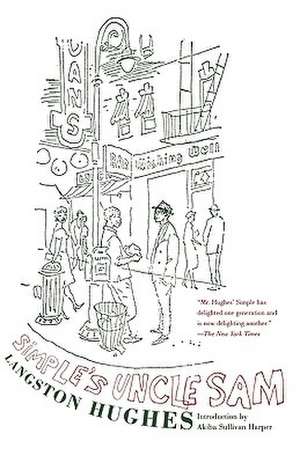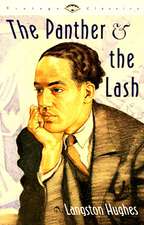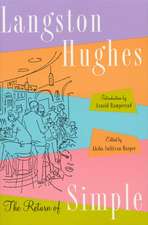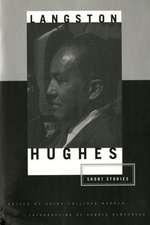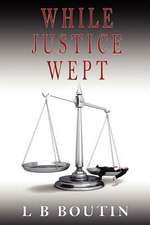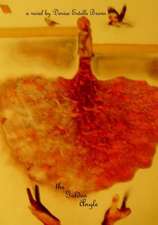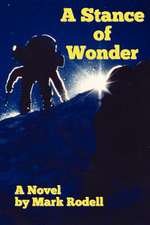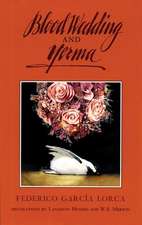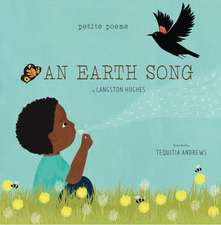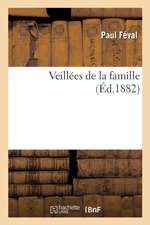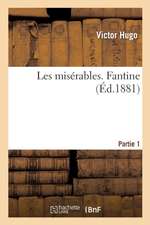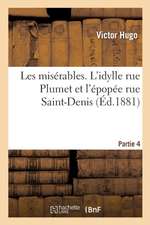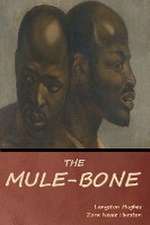Simple's Uncle Sam: With a New Introduction by Akiba Sullivan Harper
Autor Langston Hughes Akiba Sullivan Harperen Limba Engleză Paperback – 30 apr 2000
Langston Hughes's most beloved character comes back to life in this extraordinary collection
Langston Hughes is best known as a poet, but he was also a prolific writer of theater, autobiography, and fiction. None of his creations won the hearts and minds of his readers as did Jesse B. Semple, better known as "Simple." Simple speaks as an Everyman for African Americans in Uncle Sam's America. With great wit, he expounds on topics as varied as women, Gospel music, and sports heroes--but always keeps one foot planted in the realm of politics and race. In recent years, readers have been able to appreciate Simple's situational humor as well as his poignant questions about social injustice in The Best of Simple and The Return of Simple. Now they can, once again, enjoy the last of Hughes's original Simple books.
Langston Hughes is best known as a poet, but he was also a prolific writer of theater, autobiography, and fiction. None of his creations won the hearts and minds of his readers as did Jesse B. Semple, better known as "Simple." Simple speaks as an Everyman for African Americans in Uncle Sam's America. With great wit, he expounds on topics as varied as women, Gospel music, and sports heroes--but always keeps one foot planted in the realm of politics and race. In recent years, readers have been able to appreciate Simple's situational humor as well as his poignant questions about social injustice in The Best of Simple and The Return of Simple. Now they can, once again, enjoy the last of Hughes's original Simple books.
Preț: 102.08 lei
Nou
Puncte Express: 153
Preț estimativ în valută:
19.53€ • 20.45$ • 16.16£
19.53€ • 20.45$ • 16.16£
Carte tipărită la comandă
Livrare economică 05-19 aprilie
Preluare comenzi: 021 569.72.76
Specificații
ISBN-13: 9780809086818
ISBN-10: 0809086816
Pagini: 208
Dimensiuni: 138 x 209 x 14 mm
Greutate: 0.26 kg
Ediția:Rev
Editura: Hill & Wang
ISBN-10: 0809086816
Pagini: 208
Dimensiuni: 138 x 209 x 14 mm
Greutate: 0.26 kg
Ediția:Rev
Editura: Hill & Wang
Notă biografică
James Mercer Langston Hughes (February 1, 1901[1] - May 22, 1967) was an American poet, social activist, novelist, playwright, and columnist from Joplin, Missouri. He moved to New York City as a young man, where he made his career. One of the earliest innovators of the then-new literary art form called jazz poetry, Hughes is best known as a leader of the Harlem Renaissance. He famously wrote about the period that "the negro was in vogue", which was later paraphrased as "when Harlem was in vogue."[2]
Growing up in a series of Midwestern towns, Hughes became a prolific writer at an early age. He graduated from high school in Cleveland, Ohio and soon began studies at Columbia University in New York City. Although he dropped out, he gained notice from New York publishers, first in The Crisis magazine, and then from book publishers and became known in the creative community in Harlem. He eventually graduated from Lincoln University. In addition to poetry, Hughes wrote plays, and short stories. He also published several non-fiction works. From 1942 to 1962, as the civil rights movement was gaining traction, he wrote an in-depth weekly column in a leading black newspaper, The Chicago Defender.
First published in 1921 in The Crisis - official magazine of the National Association for the Advancement of Colored People (NAACP) - "The Negro Speaks of Rivers", which became Hughes's signature poem, was collected in his first book of poetry The Weary Blues (1926).[47] Hughes's first and last published poems appeared in The Crisis; more of his poems were published in The Crisis than in any other journal.[48] Hughes' life and work were enormously influential during the Harlem Renaissance of the 1920s, alongside those of his contemporaries, Zora Neale Hurston,[49] Wallace Thurman, Claude McKay, Countee Cullen, Richard Bruce Nugent, and Aaron Douglas. Except for McKay, they worked together also to create the short-lived magazine Fire!! Devoted to Younger Negro Artists.
Growing up in a series of Midwestern towns, Hughes became a prolific writer at an early age. He graduated from high school in Cleveland, Ohio and soon began studies at Columbia University in New York City. Although he dropped out, he gained notice from New York publishers, first in The Crisis magazine, and then from book publishers and became known in the creative community in Harlem. He eventually graduated from Lincoln University. In addition to poetry, Hughes wrote plays, and short stories. He also published several non-fiction works. From 1942 to 1962, as the civil rights movement was gaining traction, he wrote an in-depth weekly column in a leading black newspaper, The Chicago Defender.
First published in 1921 in The Crisis - official magazine of the National Association for the Advancement of Colored People (NAACP) - "The Negro Speaks of Rivers", which became Hughes's signature poem, was collected in his first book of poetry The Weary Blues (1926).[47] Hughes's first and last published poems appeared in The Crisis; more of his poems were published in The Crisis than in any other journal.[48] Hughes' life and work were enormously influential during the Harlem Renaissance of the 1920s, alongside those of his contemporaries, Zora Neale Hurston,[49] Wallace Thurman, Claude McKay, Countee Cullen, Richard Bruce Nugent, and Aaron Douglas. Except for McKay, they worked together also to create the short-lived magazine Fire!! Devoted to Younger Negro Artists.
Descriere
Hughes's most beloved character--Jesse B. Semple, better known as "Simple"--comes back to life, speaking as an Everyman for African Americans, in this extraordinary collection. Simple's witty commentary covers topics ranging from women to Gospel music to sports heroes.
